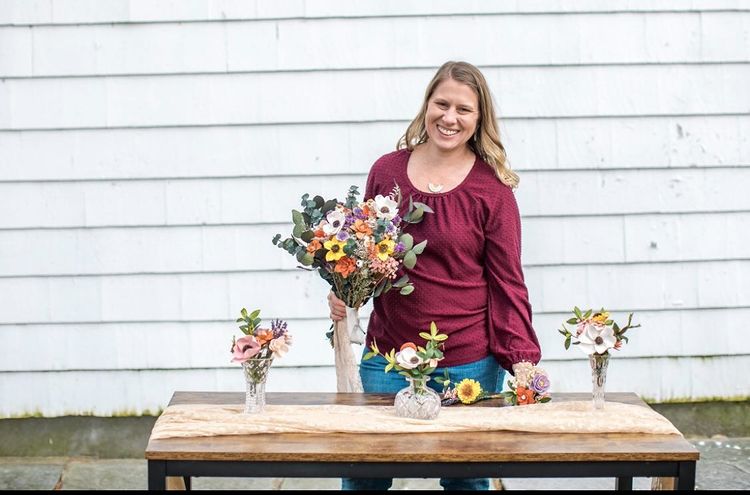If you ask any small business owner, they will agree: Running your own business is rewarding, but incredibly difficult. Small business owners are even more than just an owner. Often, we are also our own manager, production team, marketing team, accountant, and customer support as well. With this many roles and responsibilities, owning a small business can significantly impact someone’s mental health.
Nevertheless, the topic of mental health in small business (as in many other careers) is still very stigmatized. So, I want to share some of my personal experiences, as well as spotlight the experiences of other small business owners, to help open up a discussion about this topic!

Let’s talk about mental health challenges!
First and foremost, mental health challenges in small business can come from a variety of sources. Acting as an entrepreneur and starting your own business can be an extremely isolating process. Nothing can move forward without your initiative and hard work — No one is going to do it for you! As a result, however, self-care may take a backseat to the responsibilities and requirements of taking steps to grow your business.
Sometimes, I find myself ignoring my personal struggles to focus on clients and business-related problems. And, even if you have a great support system in place, it can be isolating to undertake such an independent journey that few of your friends or family may be able to understand.

Furthermore, when you work in the wedding industry, you have to learn to accept rejection. Clients will ask for lower prices, ask for changes you cannot make, or just stop responding entirely. In the past, I have undersold myself just to please a client. But, underselling my labor and creativity undercuts my worth. Although rejections will always hurt, I am constantly working to remind myself that I am talented and worthy!
What is Imposter Syndrome?
If you’re not familiar with this term, it refers to the feeling that you are inadequate compared to everyone else in your field, even when this is untrue. In fact, this experience is extremely common. However, within a small business, it particularly easy to compare yourself to others and feel disappointed or inadequate.
This is especially true when you are first starting out in your business. When I first started Custom Creations Boutique, I felt intimidated by more experienced wedding vendors. Every “no” from a client felt very personal. I felt like a failure, leading to frustration with the pace of my growth. Many small business owners struggle with this experience when just starting out.

Even now, with CCB proudly thriving nearly 5 years later, it’s hard not to compare myself to others. With the readily-available social media world at our fingertips, I often see other designers showcasing a unique skill and am transported back to feelings of inadequacy. One thing that I try to remind myself: We all have our own specific talents! And, I am constantly learning new techniques and developing my skills.
As long as I am always growing, I can always be proud of myself. I like to remind myself of this with one of my favorite quotes: Progress over perfection!
Intersections of mental health and physical health
Mental health challenges are not unique to small business owners. In fact, many people struggle with them even before starting their own business! For example, I have always struggled with ADHD, anxiety, and seasonal affective disorder. In addition, I experience debilitating migraines, as well as other chronic illnesses, which severely affected me even before beginning my business. However, running this business can amplify those pre-exisiting challenges even more.
The stressors and demands of a small business can wear you down, both emotionally and physically. Sometimes, feeling overwhelmed by my work can trigger a flare-up. Additionally, overworking can cause me to sacrifice self-care, which can further impact my health. Nevertheless, without other employees to keep my business running, I can’t delegate responsibilities in order to take care of my health.
Inevitably, therefore, physical health and mental health are intertwined. Flare-ups and physical pain can lead to increased stress, anxiety, and depression. At times, it can be hard to manage both these physical and mental symptoms, while also working hard to grow my business.

At the end of the day, I try to remind myself that my business is me. This means that self-care improves my business, in addition to helping my mental and physical well-being, to help me be the best I can be, for myself and my clients!
Photo: MisaFlix Photography
These mental health challenges are not uncommon for small business owners.
Here’s what some other wedding vendors have to say about their experiences with mental health.
Photographer MisaFlix shared some insight about her experience with imposter syndrome while starting up her business:
“Every time that I opened social media last year as a small business owner, I couldn’t help but compare myself to other photographers. Ones that were posting frequently and ones that were booked everyday for the rest of next year already. Not to mention, it was my first official year being a business owner. I felt like I was a failure and it took a toll on me that I almost quit photography. If it wasn’t for the people around me, I wouldn’t have kept going.

It took me several months before I realized that I don’t need so many likes or so many bookings to be considered successful. There are days where I can say I still struggle with those instances, but then I compare what my bookings were last year to this year and think – wow, how far I’ve come.”
Makeup artist LA Page Makeup also shared her experiences with mental health struggles with us.
I love that she focuses on taking care of her mind and body as part of her business!
“Growing and maintaining a business is hard, time-consuming, energy-sucking work. It’s simultaneously one of the best and hardest things you can do. So when I finally decided to put my foot down and take at least one full day off a week, my life started to improve. My body and mind have a chance to rest, which ultimately improves my productivity and satisfaction levels with my work.

It’s important to me to be transparent with my clients and colleagues because at the end of the day, we’re all human and we have a lot of shared experiences. Making your mental health a priority will always be worth it.”

Photographer Claudia Photos also shared her struggles with the toll that growing your own business can take. She emphasizes the difficulty of separating personal life from work to make time for self-care!
“I’d say 99% of my time I’m thinking or doing something for my business. I find it hard to disconnect, to enjoy my personal life without always having a thought in the back of my head. Separating personal life and work when you’re a small business owner is hard. It can be very frustrating because even when you try and make an effort to do something else than just working-because that’s what a small business owner does most of their time- the thought is still there. I’m working very hard on making myself take more time for my personal life.”
Floral Designer Wood and Word Blooms shared a similar experience about the difficulty of balancing her small business with her personal life:
“I think it’s personally tougher wedding vendors to carve out time for their selves and their families because weddings are on weekends when you’re off and home with your kids. I know I personally have limited my business bottle to primarily pick-ups prior to the event, and don’t deliver on the day of the wedding so that I can make time to do fun things with my family.

As a mom and teacher, I think it’s really crucial that you do something for yourself every month. For me, I take the time to get a monthly massage and do yoga so that I can re-center.”
If you find that these experiences resonate with you, here are some great tips from Wedding Planner and Designer, All Sett Up!
These are great mantras to tell yourself when you’re struggling:

- It’s okay to set boundaries.
- It’s okay to do what’s best for you.
- Not everyone has to like you.
- Setbacks don’t equal failure.
- Beauty and strength come from within.
If you related to any of these feelings, I want to encourage you to share your experiences too. Together, we can break the stigma of talking about mental health! And, if you are struggling, reach out to someone. Therapy, counseling, and medications are all forms of self-care, and are important tools that you can use to keep yourself healthy when needed. And never forget the power of speaking about your struggles — With friends, family, and maybe even your stationery designer, you are not alone!